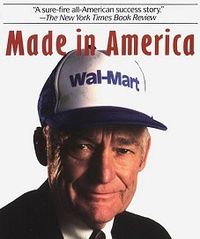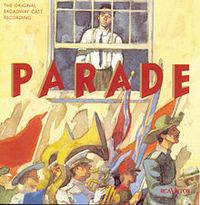Think of this as Volume 16, Number 49 of A-Clue.com, the online newsletter I've written since 1997. Enjoy.
 Following any political realignment
Following any political realignment
there is often a re-evaluation of a major sector in American
business. It's not the heart of the losing side that's attacked, it's
usually something on the periphery that represents something larger.
In the 1970s this was Detroit. GM and
Chrysler and Ford were all symbols of the manufacturing era, the
post-War boom in which factories were where wealth came from. The
attacks that began with Ralph Nader in the 1960s accelerated during
this period until the industry became symbolic of what was obsolete
about America. The movement of production, first to Japan, then to
Korea, and eventually back to the American South, was also symbolic
of the “Rust Belt – Sun Belt” attitude that was so much a part
of the Nixon era.
 So it makes sense that, in our time, we
So it makes sense that, in our time, we
would look for some similar symbol to go after, and I think we've
found it in Wal-Mart.
I think the labor troubles at Wal-Mart are emblematic of something much deeper, and something that started
some time ago. Books like “How Wal-Mart is Destroying America” and “The Wal-Mart Effect”
were less about Wal-Mart itself but the business system and consumer
society that had created it.
What these books, and the labor strife
that has followed, ask is simply this. Is Wal-Mart good for America?
And as with GM a generation ago, the question itself is also deeper,
and aimed squarely back at the people asking it.
If the GM question was being asked of
the manufacturing sector that was the heart of prosperity in the
Roosevelt Era, so the Wal-Mart question is being asked of the service
and consumer sectors that have been at the heart of the prosperity in
the Nixon era. And the answer to the Wal-Mart question is,
increasingly, no.

Wal-Mart decided to build a new retail palace near Decatur, Georgia.
Decatur is thriving, thanks to the laboratory economy around Emory
University. It's filled with people who make big money working there,
or at the CDC, or at other campuses like Georgia Tech and Georgia
State. The area fairly bristled with yard signs opposing the new
store, and while Wal-Mart eventually won the battle, it led to the
city moving to annex the area in question. This ain't over.
To many in the Creative Class, Wal-Mart
is shorthand for shoddy goods, for shoddy treatment of both employees
and customers, for everything that is wrong with the old suburban cul
de sac culture. And it's these people who are leading the
lower-income people who work for Wal-Mart (and who benefit from its
pricing policies) against it.
Whether Wal-Mart acknowledges it or
not, the company is becoming politically polarizing, and that's never
a good place for a business to be. You think anyone who reads
DailyKos is going in one? I don't. And while Wal-Mart can live without that business today, GM
could live without those who were protesting it in 1972.

Back in the 1980s the papers were filled with glowing tales about
how personally frugal he was, and about how he called his employees
“associates,” plying them with stock options until many became
millionaires. The idea was that they were all in this together, a
great crusade to bring the bargains of the city to the people in the
countryside.
To get there Wal-Mart took advantage of
all the new capabilities that came about in the last third of the
century. They were way ahead of the game in logistics, in sourcing
from China, in using computers to keep the shelves well-stocked and
to anticipate consumer demand. But something went wrong along the
way.
For one thing, Sam died. And his kids
thought that, because they started life on third base, they had all
hit home runs. They have been overly privileged nags to the rest of
society, nothing like their old man. As with GM a generation ago,
Wal-Mart management has also become more insular, more convinced of
its righteousness.
How else do you explain what's
happening now? It's not like Wal-Mart can't afford to treat its
employees well. Costco does, and Costco makes a lot of money. Instead
we read stories about Wal-Mart employees being on food stamps, about the company deliberately cutting hours so workers won't
qualify for health insurance, about average wages of $8.81/hour that, in effect, prevent other retailers from raising their
employees' pay. Quite a distance from making associates into
millionaires through stock sales.

Wal-Mart has become the bete noire of
the Obama coalition just as GM became the bete noire of the Nixon
coalition. It's an unsustainable path. But just as it was with GM a
generation ago, no one at the company sees it.
When they do, it may be too late.











phentermine 37.5
Dana Blankenhorn: Is Wal-Mart Good for America
baby coupons
Dana Blankenhorn: Is Wal-Mart Good for America
utility warehouse
Dana Blankenhorn: Is Wal-Mart Good for America